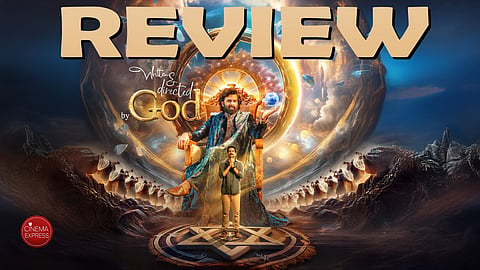Written & Directed by God Movie Review: A preachy parable that falls flat
Written & Directed by God(1.5 / 5)
On paper, Written & Directed by God is a fun-filled fantasy. A disillusioned young man confronts God, quite literally, and embarks on a redemptive journey. But in execution, Febi George’s debut feature leans too heavily on old-school sentimentality and simplistic storytelling, never quite finding the spark needed to elevate its big ideas into compelling cinema. Saiju Kurup leads the film as Jijo, a struggling filmmaker with a chip on his shoulder and a bone to pick with the Almighty. When God, played by Sunny Wayne, appears before him, a fantastical road trip ensues. If the premise vaguely reminds you of Bruce Almighty, you are not wrong. Unlike that Hollywood satire, Written & Directed by God aims more for tear-jerking transformation than comedic chaos. Unfortunately, it neither embraces the fun nor manages the emotional weight convincingly.
Director: Febi George
Cast: Saiju Kurup, Sunny Wayne, Aparna Das
A more apt comparison would be the Mammootty-starrer Pranchiyettan & the Saint, where an ordinary man’s divine dialogue becomes a gateway into his insecurities and growth. That film, though, made us care deeply about its flawed hero. Here, despite Saiju’s sincere and often energetic performance, Jijo remains oddly distant. His transformation feels more like a narrative requirement than something truly earned. One of the film’s most glaring flaws is its relentless tendency to sermonise. Nearly every major character seems to take turns delivering moral lectures. God preaches to Jijo about virtue and selflessness, Jijo imparts wisdom to a troubled boy, and yet another character offers a monologue on parental responsibility. Rather than allowing the story to explore these themes organically, the film piles on didactic speeches with the subtlety of a megaphone. What could have been moments of quiet introspection instead feel like excerpts from a believer’s brochure, stripping the drama of nuance and leaving little room for interpretation. The result is storytelling that feels more like a series of scripted sermons than genuine character development.
This heavy-handedness is compounded by a second half that drags considerably. Even with a modest two-hour runtime, the film feels much longer, especially once it settles into predictable arcs and padded sequences. The plotting becomes more sketchy and emotionally disengaged, with too many convenient resolutions and undercooked character turns. What also does not help are the oddly placed songs. Though Shaan Rahman’s melodies are soothing in isolation, their frequent interruption, especially in the latter half, kills whatever little momentum the narrative manages to gather. The romantic subplot between a young couple revealed through yet another montage feels dated and awkwardly handled.
There are scattered moments of genuine humour, but they are few and far between. The dialogue, while well-meaning, rarely feels organic, and many interactions lack the emotional texture that could have made this fantasy feel grounded and personal. Among the cast, Sunny Wayne’s portrayal of God is too casual to be compelling. Aparna Das does what she can, especially since her character is reduced to a standard-issue romantic figure with little agency or complexity. The supporting roles are similarly thinly written, making it hard to invest in their journeys or resolutions. Visually, the film does not fare much better, save for a string of bird’s-eye-view shots that are inserted purely because the story involves God. Far from profound, these shots come off as gimmicky and distract us from the film’s already wavering focus.
Written & Directed by God wants to say something uplifting about second chances, compassion and divine intervention. But with its old-fashioned direction, clumsy storytelling, and an overbearing tendency to spell out every emotion, the film becomes more exhausting than enlightening. There’s a clear intent to inspire, but little trust in the audience’s ability to engage without constant hand-holding. By the time the credits roll, the film feels less like a spiritual fable and more like a long-winded lecture dressed up as cinema.

